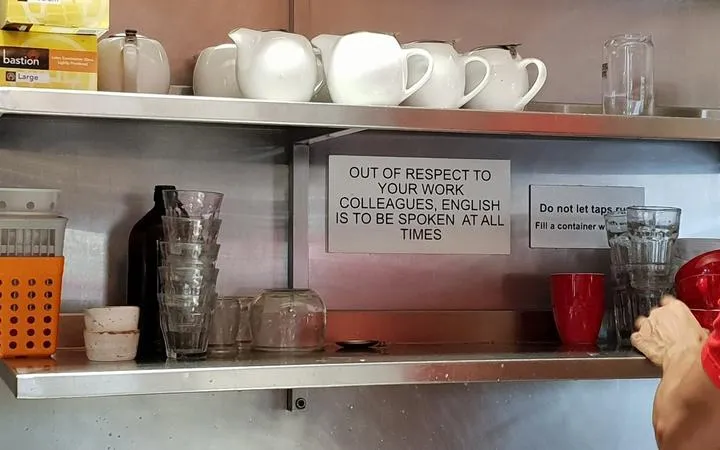Table of Contents
When I started work back more than a few years ago, none of my employers would have needed to put up a sign urging staff to respect their fellow workers and speak English only in the workplace. We had heaps of people from all over the world on some sites I worked on and not one of them needed to be told. It was a given.
We had some neighbours in the working class suburb I grew up in who had arrived in New Zealand as assisted immigrants post World War II. Their English was awfully hard to understand and while the kids picked it up quickly, the parents struggled until the day they died. However, they had a family policy (which over time I found to be common practice with many immigrants), that at home they would communicate in their mother tongue but when in public, no matter how hard it was and no matter how bad they knew they sounded, they would speak English. I salute them for their cultural sensitivity and common sense.
So when Circus Circus Café in Mt Eden was “dobbed in” by nosey parker halfwits via social media for having a sign up instructing staff to speak English, I wondered why anybody would give a toss. I further wondered (for all of a split second) why our MSM would feel it warranted so much as a mention. I have neither the time not the patience to waste on social media, so I pick up things like this from the MSM and the Stuff story reads:
“A sign in an Auckland cafe asking staff members to speak only English has been removed after it sparked debate when posted on social media.
The sign on display next to shelved cups behind the counter at Circus Circus in Mt Eden, said: “out of respect to your work colleagues, English is to be spoken at all times”.
Louisa Tipene Opetaia, who had visited the cafe before, said she was shocked when she saw the image and would rather spend her time and money on businesses that encouraged multilingualism..”
“Obviously it’s their business and they can run it how they want, but personally I wouldn’t want to go there and give them my business because I feel that they have such a narrow view of the world and how people communicate,” she said.
I’ve never been to the Circus Circus Café, nor have I ever met Louisa Tipene Opetaia but I have a couple of observations.
Louisa, you’re quite correct, it is indeed their business and they should indeed be able to run it “how they want” – except you don’t agree with them doing what they want at all and have publicly stated that you won’t give them your business if they do run it “how they want”. In other words, not only are you telling them they shouldn’t run it as they want, you are telling them that if they do so, you won’t support them with your business (and the implication clearly is that neither should others), because you feel “that they have such a narrow view of the world and how people communicate”.
Louisa “would rather spend her time and money on businesses that encouraged multilingualism”.
What could be a more narrow view of how people communicate than to suggest any group should communicate in their own language with others who neither understand nor speak that language?
This looks to me like about as multicultural a business as you’d find anywhere, as the General Manager of the café Nixon Sherchan (himself from Nepal) said:
“The sign has been put up after he received complaints from some staff that they did not understand their colleagues.
He said staff came from India, China, Bangladesh and New Zealand.”
That would give dozens of language options and if you’re about to drop hot fat on someone you’d best be saying it in a language they understand I’d have thought!
I couldn’t resist pointing out the irony. I’m sure Louisa means only well and we all know people in New Zealand are not in any way discouraged from speaking their mother tongue. Neither should they be. However, it’s common sense in a commercial kitchen that they should speak a mutually understood language and a sign reminding staff of that is just common sense.
It’s also polite and appropriate to speak the “common” language in front of others that don’t speak your mother tongue. But of course, politeness has joined common sense at the bottom of the landfill of life.
If you enjoyed this BFD article please consider sharing it with your friends.









